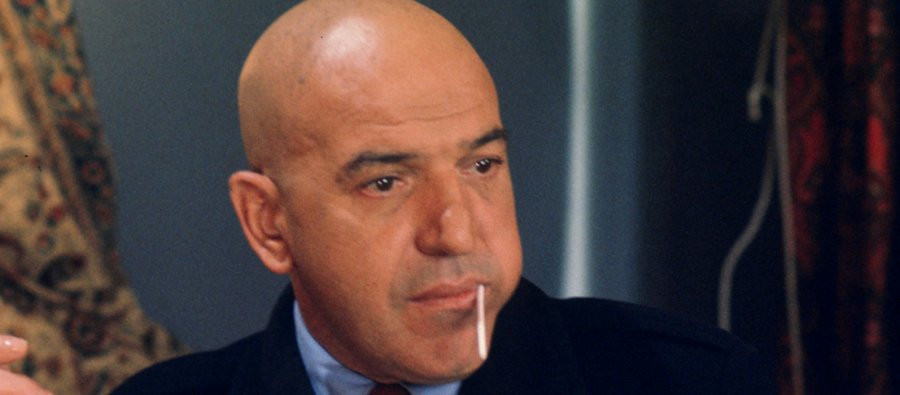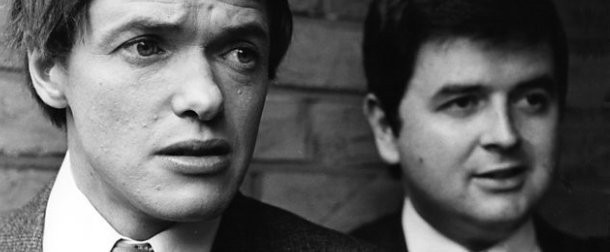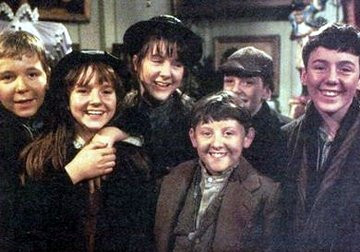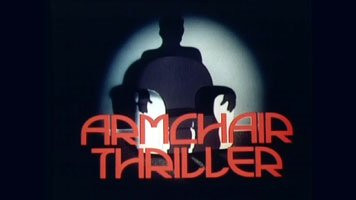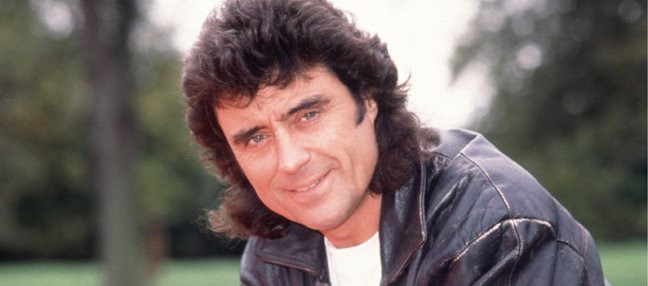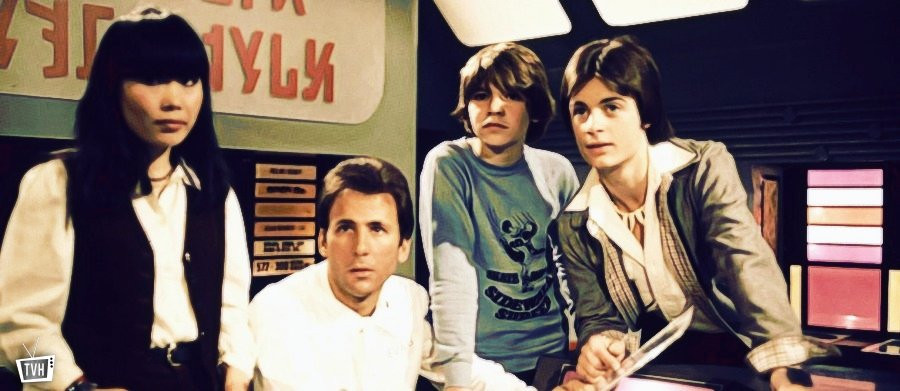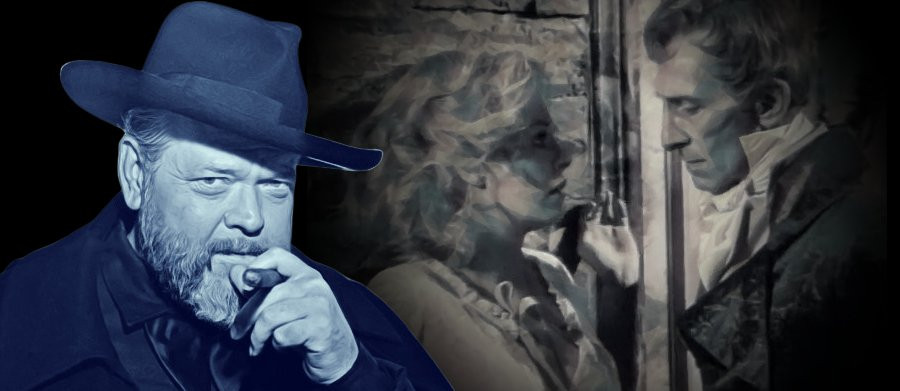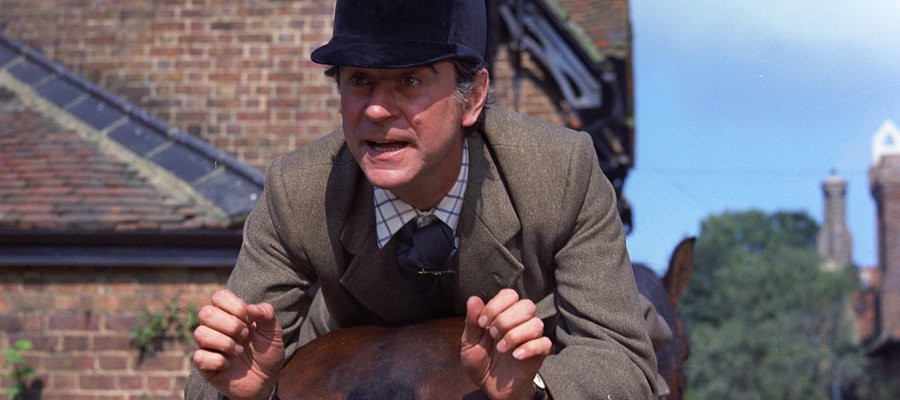
Whatever Happened To The Likely Lads
1973 - United KingdomOf all the theme tunes of all the sitcoms in all the world, the most haunting is the one that introduces Whatever Happened to the Likely Lads?
Whenever I hear the song I am transported back to summer nights on Teesside (they are always summer nights) with mam, dad and my two sisters, imagining I am one of those kids playing among the demolished housing in the end credits. Oh, what happened to you, whatever happened to me? What became of the people we used to be? Tomorrow’s almost over, today went by so fast. It’s the only thing to look forward to – the past.
Tomorrow has been and gone for my mam and dad but I often wonder what became of that little boy and whether he turned out the way he would have liked.
As the theme tune suggests, it is a programme about the past, the future and the tension that exists between the two. It also neatly captures the changing relationship between the upwardly mobile Bob Ferris, played by Rodney Bewes, and the resolutely working-class Terry Collier, played by James Bolam, who spends most of his time acting as an anchor to Bob’s aspirations.
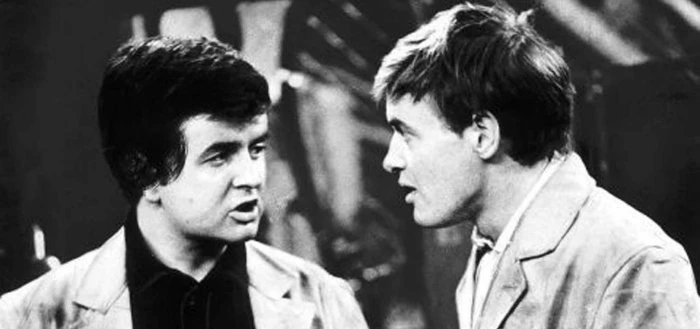
Made between 1972 and 1975, it is a sort of sequel to The Likely Lads, a series which ran from 1964 to 1966. The credits that introduce each episode are a neat nod to the earlier series as they consist of stills from it in the style of a photograph album.
The 1960s was a time when someone in British films made the bold decision to depict northerners as real people. The Likely Lads was as defiantly northern as films like Saturday Night and Sunday Morning, A Kind of Loving and This Sporting Life.
Although not prominent cinematic names, Rodney Bewes and James Bolam appeared in a couple of classic films with Tom Courtenay.
Bewes had a small role in Billy Liar while Bolam appeared as Courtenay’s partner in crime in the Loneliness of the Long-Distance Runner. Bolam and Courtenay’s characters were doomed to borstal and, in these two not so likely lads, it is easy to see what Bob and Terry could have been without better guidance or more common sense.
The Likely Lads ended with Bob running away to join the army, only to be rejected because of his flat feet. Terry joined up to be with Bob and spent the next five years in the army, alone.
The sequel dates from a time when great comedy writers seemed to come in pairs – Galton and Simpson, Chesney and Wolfe, Esmonde and Larbey, and the creators of the Likely Lads, Dick Clement and Ian Le Frenais.
While Terry has been away, Bob has become engaged to his on-off childhood sweetheart Thelma, got a good job with his future father-in-law’s building firm and is anticipating a life of wedded bliss on the Elm Lodge housing estate.
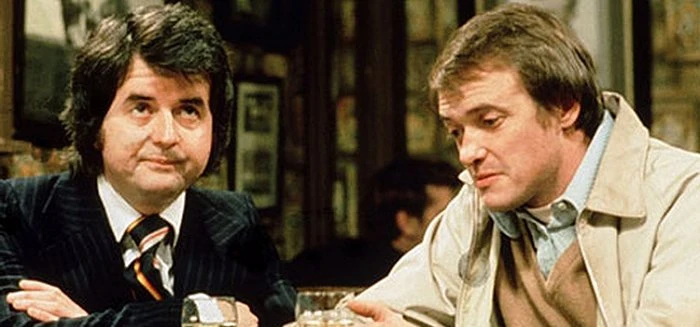
Terry meanwhile has returned to his parents’ terraced house with little prospect of work and a failed marriage to a German girl behind him. As he says in the episode No Hiding Place, broadcast at a time when the UK had recently joined the Common Market, England should take heed of the failure of his entry into Europe. He would probably be proud that, forty odd years later, a slim majority of the British voting public heeded his advice.
No Hiding Place is the episode that everyone remembers. It’s the one where, in order to win a bet with their old friend Flint, Bob and Terry attempt to survive the day without hearing the result of the England v Bulgaria football match. Their attempts are hampered by Flint who follows them around, intent on spoiling the match for them and winning his bet. This is Flint’s only appearance in the show which is a shame as he’s played by Wrestler, Actor, Writer Brian Glover.
He is quite obviously a Yorkshireman but this shouldn’t come as a surprise as very few north eastern actors appear in the show.
No doubt this is because there were few actors from Tyneside, Teesside or Wearside plying their trade at the time. Apart from Mr Bolam, Alun Armstrong seemed to be the go-to guy to play north easterners and he appears as not so hard man Dougie Skafe in the episode Conduct Unbecoming.
I tuned in to Vera the other day and noticed a similar lack of Geordie accents so it could be that the dearth of decent North East actors hasn’t improved in the intervening years.
Brian Glover doesn't appear much in No Hiding Placebut he leaves his mark, particularly when he catches up with Bob and Terry seeking sanctuary in the church and has to hand over a fiver to placate the vicar, played by Donald Gee. Just as you rarely see Deryck Guyler out of police uniform, Mr Gee is seldom without a dog collar. He popped up, unfrocked, as a villain in an episode of The Avengers from 1968 recently rolled out on ITV4, and the name of his character was Vickers. Perhaps fate, or at least the scriptwriter, was having a little joke.
No Hiding Place contains one of their most memorable dialogues in which Terry critically dissects the characteristics of various nationalities before concluding that he doesn’t really like anyone on the other side of his front door. It’s a sad declaration from Terry as it forces the viewer to the logical conclusion that perhaps Terry doesn’t like himself all that much either.
My favourite episode is The Expert, in which the writers exploit the comic possibilities of spouses and other strangers being locked in bedrooms and the readiness of friends to give advice that they’re not at all qualified to give. Lugless Douglas gets a name check too. The writers must have liked the name as he also crops up in Porridge. Galton and Simpson did a similar thing with Oil Drum Lane, which was an address used in the Missing Page episode of Hancock’s Half Hour before Steptoe and Son took up residence there.
The episode is home to one my favourite lines. Due to misunderstandings essential to sitcom, Bob has separated from Thelma. Terry is on hand to offer advice to Bob and admonishes him with the words ‘That’s a bit savage, a bit menacing - you’re Henry Fonda not Anthony Quinn’ when Bob essays a fierce rehearsal of the line ‘Thelma, I absolutely refuse to discuss the matter’.
It’s a line resonant of hours spent in darkened picture houses, soaking up the personalities and events on screen until they’re wrung out at a later date in beautiful and subtle observations.
Unfortunately for Bob, Thelma is in no mood to discuss the matter either and tells him so before he has the chance to unleash his inner Henry Fonda.
The theme that appeals to me most is the call of the past. I remember watching the episode Moving On as a kid and feeling uncomfortable and sad, even then, about the passage of time. Bob takes Terry on a tour of Newcastle and tells him of all the buildings from their adolescence that have been knocked down.
‘The Go-Go? Gone?’ exclaims Terry sadly as Bob informs him that the car park in which they’re standing used to be the Go-Go Rock Club, the north’s premier music mecca. A place where Bob and Terry enjoyed happy times, chatted up girls and got drunk has now become a grey and functional municipal necessity.
For anyone interested in urban development in the north east, Bob and Terry are standing in the Trinity Square car park in Gateshead. It is the same one from which Shopkeeper, Councillor, Whatever Alf Roberts was unceremoniously thrown by Michael Caine in Get Carter.
What go-go-goes around comes around and the car park was demolished in 2010 when Trinity Square was remodelled as a shopping and leisure complex.
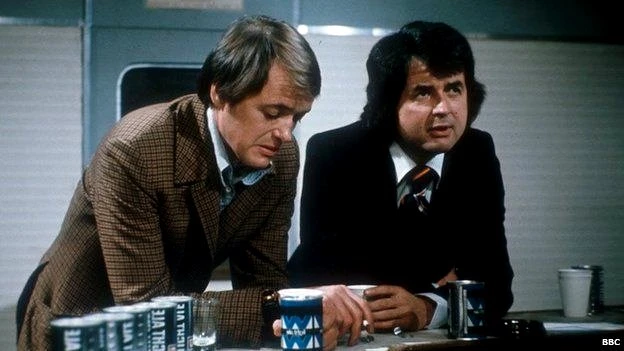
We all know how Bob and Terry feel as they drive around Newcastle lamenting the changes made to the city. It’s the feeling you get when you learn that your old secondary school has been knocked down and built over. Even though a satnav can no longer direct you there, you will always know where the school gates stood. I wonder what made way for the Elm Lodge housing estate?
Bob quite often finds himself torn between his old life represented by Terry and his new life symbolised by his fiancée and soon to be wife Thelma Chambers. The redoubtable Thelma is played by the ever-watchable Brigit Forsyth who, I am glad to say, still turns up occasionally on TV today.
A librarian by trade, Thelma can read Bob and Terry like a book. Terry often greets her with ‘Hello Thelma….pet’ and the pregnant pause before ‘pet’ shows that he is as wary of her as he has every right to be.
She knows that Bob is not strong enough to resist spending time with Terry and, as in the episode Affairs and Relations, is more than willing to spoil a cosy fishing trip between the two. She suspects Bob of having an affair when, of course, it is her father who is indulging in a bit of unpaid overtime with his secretary. It is, I think, a well-judged comment on how we all appear to play happy families, but no-one ever knows what’s going on behind the net curtains, even with our own nearest and dearest.
Thelma is right to be suspicious of Bob because he is not above a flirtation with the lovely Wendy, his secretary at work and, in the Christmas episode from 1974, he enjoys canoodling with his ex-girlfriend Joan of Arc at a fancy-dress party. Like with most men, alcohol goes straight to Bob’s loins, as Thelma shrewdly acknowledges when on the hunt for her errant husband.
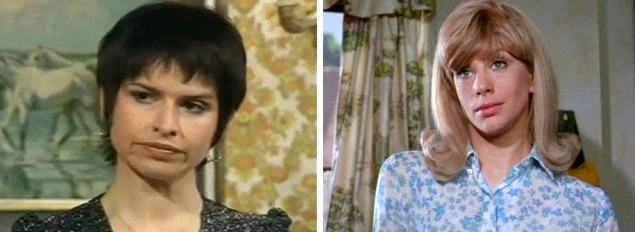
I’ve often wondered why Bob never made a play for Terry’s attractive sister Audrey. Perhaps he did have a fling with her and spent the rest of the series in quiet fear lest Thelma, Terry or the viewing public find out. Audrey was played by Sheila Fearn. She is yet another actress who is sadly under-used in TV land but her accomplished appearances in this and George and Mildred would make any actress proud.
I am glad that the warm, witty, wonderful Christmas episode was the last one, rather than the disappointing series two finale The Shape of Things to Come. This strives for poignancy by comparing the characters of Terry’s recently- deceased great uncle Jacob and his friend Joe with Bob and Terry. How would you like to be thought of when we’re gone? We are all entitled to our opinion on others, but we should be prepared to acknowledge that others are entitled to an opinion on us. It must be troubling to be no longer around to refute any unkind comments. The episode is a thoughtful one but it is let down by not being all that funny.
Bob’s weekly sessions at night school, the ski-ing trips and badminton evenings with Hugh and Janey represent Bob and Thelma’s world. They are moving onwards and upwards while Terry is stuck in the past. It’s a world to which Terry could never be allowed access, even if he wanted it.
Hugh and Janey join a powerful cast of characters, including Little Hutch, Deirdre Birchwood and Frank Clark, who are frequently referred to but never seen. This is a wise move. How many times have we heard other people’s friends being referred to and wondered what they are like? They could never be as wonderful, or as terrible, in real life as they are in our own imaginations. Whatever happened to Hugh and Janey? I don’t know for certain, but I choose to believe that their relationship stayed the course and they are now living in happy retirement somewhere in Northumberland.
For all of Bob’s upward mobility, he still occasionally yearns to be like Terry.
‘What a lovely bloody life you lead’ Bob tells Terry at the end of The Ant and the Grasshopper with a heady mix of envy and reproach. While Bob has entered the grown-up world of mortgages and keeping up with the Joneses, Terry is content to treat the present as a sort of limbo. He is happy for it to chug along until it becomes the past, to be discussed down the Black Horse with stories beginning ‘Remember when….’
Despite Terry’s resentment of Thelma and her values, he puts his social conscience on the back burner to have a brief romantic fling with Susan, Thelma’s sister. Home on a visit from her fiancé and new life in Canada Susan somehow falls for Terry’s charms until they both come to their senses and realise it would never have worked out.
I have always thought that the affair between Terry and Susan was an unconvincing plot development. Talking of which, Christopher Biggins puts in an implausible appearance as Podge, a beer drinking man’s man in the episode Birthday Boy.

In his defence, he does have previous in playing manly characters. I recently watched in disbelief when he turned up in a venerable episode of Upstairs, Downstairs from 1972 as a toff with evil designs on housemaid Sarah. He even manages to embroil Sarah’s beau Thomas in a convincing bout of fisticuffs after his lascivious plans for Sarah become apparent.
Actors join the acting profession to play a wide and varied set of characters but try telling that to Donald Gee or Deryck Guyler. In Biggins’s case, it was easier to suspend disbelief at a time when the information gap between the actor and the viewing public was wider than it is now. Biggins has since appeared in enough reality TV programmes that, if he attempted to play a role such as Podge or a thug-like toff now, he would be laughed off the screen.
Almost as pointless as Flint's visit to the hairdressers was the remake of No Hiding Place in 2003. It starred Ant and Dec who tried to pass it off as a tribute to the Likely Lads. It was more like a backhanded compliment. The only useful thing to come out of it was the realisation that Dec is a marginally less bad actor than Ant. Their millions of fans would suggest that this duo possess a talent of some sort, but this evidence would also suggest that, whatever this talent is, it is not acting.
Rodney Bewes must have really needed the work because he turns up in this as a one-legged newspaper seller that the fake Bob and Terry drive past in a seemingly driverless car in an effort to avoid seeing the score.
The critics and viewing public gave a resounding thumbs down to Ant and Dec’s tribute. This is just as well because, had it been successful, the calculating twosome would have lined up dubious compliments to other more talented duo’s than themselves like Morecambe and Wise or Laurel and Hardy. I must admit, though, that I would pay somebody else’s good money to witness their take on Derek and Clive.
Shrewd writers that they are, Dick Clement and Ian Le Frenais must surely have had a script prepared in which we meet up again with Bob and Terry. Bob will have worked his way up to senior management level and would have a nice house on a posh estate a few rungs higher up the social ladder than Elm Lodge.
He won’t have seen Terry for a good number of years until, in a reversal of roles from In Harm’s Way, he finds himself pushing Terry in a wheelchair during one of his charitable visits to the Freeman Hospital. They pass the time filling in for the lost years and reminiscing about that ill-advised bike race to Berwick-on-Tweed or Terry’s bungled DIY on Bob and Thelma’s house.
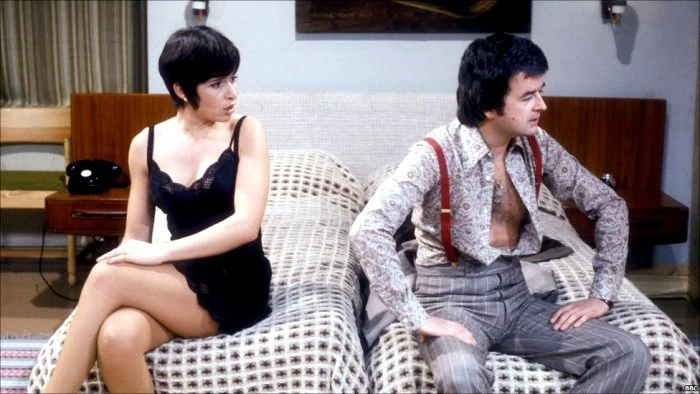
After their trip down memory lane, Bob offers to drive Terry home. Terry asks to be driven to the exclusive Darras Hall estate because he won a couple of million quid on the lottery a few years back and, lifelong socialist that he is, thought he deserved a bit of luxury. After dropping Terry off, Bob can only reflect on whether those hours spent at night school were worth it after all.
It can’t happen now, of course, because what happened to Bob is what happens to all of us sooner or later. For Bob, tomorrow’s over.
The series was shown again on the BBC in the early 1990s and the TV reviewer in The Independent newspaper referred to it as a 1970s sitcom that still has its moments. In some ways, time has caught up with the programme. Some of the fashions on display should never see the light of day again and it sobers me up when I hear how little a pint of beer cost in 1973.
I would love to live permanently in the episode The Ant and the Grasshopper in which Gloria at the Black Horse only charges 82p for two pints, a roast beef sandwich, a pasty, a cheese sandwich, a packet of crisps and two sausages with mustard. Even in freshly decimalised 1973, Gloria must surely have under-charged. I may be reading too much into it but I think perhaps she was in dispute with the brewery and decided to financially ruin them by giving stock away for next to nothing.
Parts of it have dated but the series will always be watched and appreciated as long as viewers take an interest in things that don’t date - important things like the past, friendship, love, the class system or just laughing at funny, well-crafted dialogue.
We should celebrate Whatever Happened to the Likely Lads for its melancholy take on life, Bob and Terry’s rambling conversations in the pub and for providing an opportunity to see two highly talented actors in mid-season form.
True, Bob and Terry are the creation of two gifted comic writers and they are aided and abetted by a talented support cast but it’s Bewes and Bolam who give it life. It’s a shame that, for whatever reason, they never appeared together again.
The series ended in 1975. The last we heard from Bob and Terry was in 1976 when they appeared in that rare thing, a half-decent film version of a TV comedy. Some thought went into this film. I love the way its ending harks back to that of the very first series – one of the pair decides to forsake Tyneside, only to remain in Newcastle while the other ends up leaving.
The film even has a memorable theme tune. It isn’t as haunting as the TV theme but it offers a jaunty meditation on the passage of time.
The show turns up regularly on satellite channels, so the wise viewer will take advantage of the opportunity to see Bolam and Bewes in their prime.
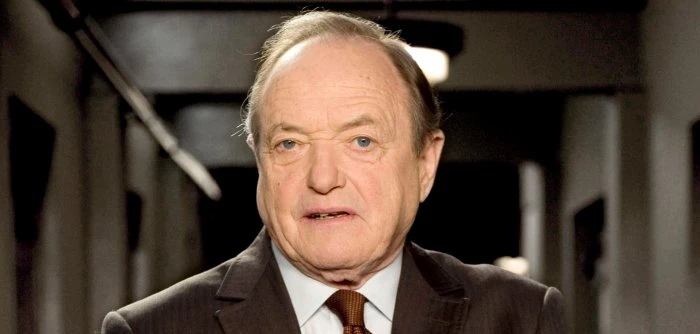
We should also celebrate James Bolam’s successful and varied TV career since the demise of The Likely Lads. We should stop and admire his work in When the Boat Comes In, The Beiderbecke Trilogy and New Tricks safe in the knowledge that any programme with Mr Bolam in the cast list is guaranteed to be quality viewing.
But while we’re celebrating Mr Bolam, we should take a lend of the bittersweet tone of the series and spare a thought for the unfulfilled promise of Rodney Bewes. He was a richly talented actor, on this showing easily the equal of James Bolam, but he never achieved such success again. After the Likely Lads and Dear Mother…Love Albert, he must have thought the streets of TV land were paved with gold. When the Likely Lads ended his TV career seemed to drift, taking in adverts for Birds Eye frozen fish, the forgettable sitcom Just Liz in the early 1980s and fizzling out with guest appearances in Doctor Who, Spender and Heartbeat.
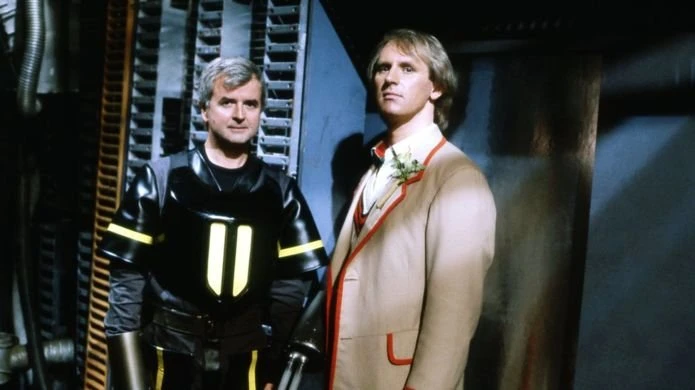
The low point must surely have been his appearance in the remake of No Hiding Place. I wonder how he must have felt standing by, on one leg if you please, as two journeymen ruined one of his greatest achievements.
It is difficult to say why some actors seem to lose their way in TV land, but we should remember Rodney Bewes in his pomp, smugly wiping a smudge of dirt from his Vauxhall Viva or, more aptly, lamenting to anyone who’ll listen that life is so unfair.
Seen this show? How do you rate it?
Seen this show? How do you rate it?
Published on February 26th, 2019. Written by Andrew Coby (February 2019) for Television Heaven.



